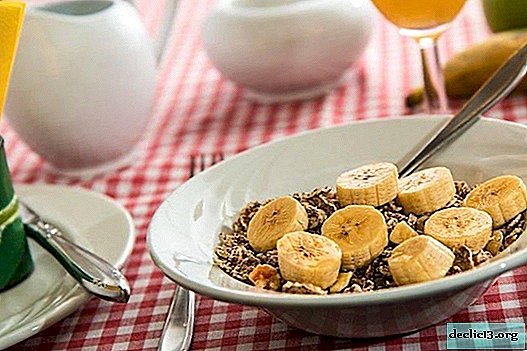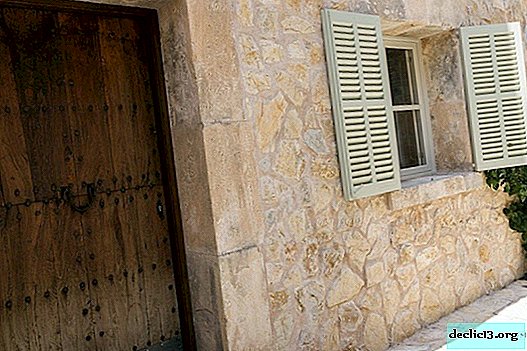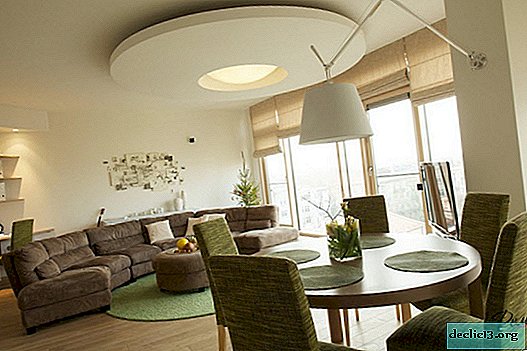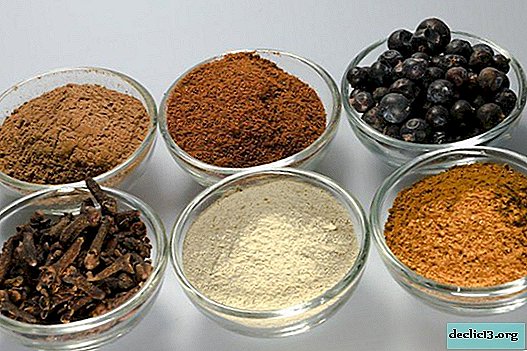What to try in Montenegro - dishes of national cuisine
Montenegrin residents surprisingly harmoniously combine such qualities as pride and independence, friendliness and tolerance for other cultures and nationalities. National features are also reflected in local culinary traditions. The cuisine of Montenegro was formed for many years under the influence of many peoples, the culinary traditions of the Slavs, Hungarians, Germans, Turks and the inhabitants of the Mediterranean were mixed in dishes.
Features of the national cuisine of Montenegro
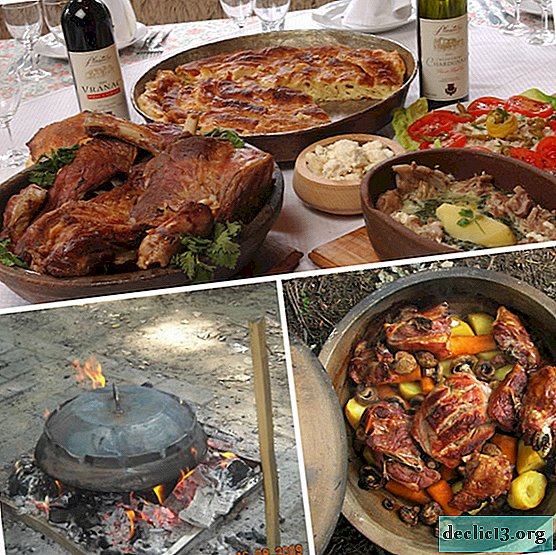 Lamb under a sachet
Lamb under a sachetMontenegrin cuisine is conditionally divided by geographical criterion. In coastal regions, Mediterranean cuisine prevails with a large number of fish and seafood, cheese and natural, fresh vegetables. In the mountainous regions, tourists and guests are treated with meat and dairy dishes.
Residents of the country rightly call their national cuisine natural and healthy. Montenegro is famous for its fertile soils, so it is not customary to use fertilizers here. Cattle are grazed on ecologically clean pastures. It is not surprising that any dish is not just tasty, it attracts with special freshness and naturalness.
The national cuisine of Montenegro is incredibly varied, a rich table is cordially served here. The main culinary traditions resemble traditional Slavic food. Meat plays an important role here, if you are lucky enough to visit the Balkans, be sure to try the hanger - chops with an amazing bouquet of spices, chevapchichi - sausages from different varieties of minced meat, razhnichi - kebabs of veal and pork. In a special way, they know how to cook meat on a spit.
While relaxing on the Montenegrin coast, try fish dishes. Our person will like the first dishes - fish soup, goulash. Trout stuffed with prunes or yapraki (carp baked in cream) - dishes worthy of a royal dinner. Connoisseurs of Mediterranean cuisine will certainly appreciate the pilaf with seafood.
 Qashqal cheese
Qashqal cheeseDuring a trip to Montenegro it is impossible to resist and not try cheese. There are a lot of varieties of cheeses, since it is an obligatory ingredient in various dishes - appetizers, first courses, it is added to cereals, salads and desserts. Be sure to try the tortillas with cheese - Qashqal, Kachamak.
Of course, the meal traditionally ends with dessert and drinks. For the production of sweets, nuts and fruits are used. As for drinks, coffee and tea are appreciated here. Wine produced in Montenegro is not very common on international markets, however, it is worth a try.
 Montenegrin wine Vranac
Montenegrin wine VranacVranac is a visiting card of Montenegro, a wine with a pronounced tart flavor. It is produced throughout the state, so several dozen varieties are presented in the assortment. National white wines are served with fish and vegetables, the most popular are Krstach and Sauvignon. If you want to try something stronger, order grape vodka - Krunak.
The assortment also has European dishes - ice cream prepared according to Italian recipes, pizza, hamburgers, risotto.
Visiting Montenegro, you will understand that this is an incredibly picturesque country with a rich culinary heritage, seasoned with the hospitality and hospitality of the inhabitants.
How much does it cost to eat in Montenegro
The most expensive food in Montenegro is seafood. Often in restaurants, the cost is indicated per 100 grams, pay attention to this nuance. The average cost of lobsters or fish of exotic varieties is 15 euros per 100 g. Be prepared that you will have to pay from 60 to 75 € for an impressive portion weighing 400-500 grams.

The price of main courses varies from 10 to 20 €. The cost of salads is usually from 5 to 10 €. Desserts cost from 3 to 8 €. The price of first courses is from 3 to 7 €.
In the most expensive restaurant, a delicious, hearty dinner for a family of two adults and two children will cost 60-70 euros, and lunch for two in the resort area - 25-30 euros.
If you relax in the coastal regions, be sure to try takeaway dishes, they are sold in numerous stalls on the coast. Pizza costs 2 €, a huge hamburger - 3-4 €, a barbecue costs a little more expensive - 4-5 €, and a delicious sausage can be bought for 2 €.
National dishes of Montenegro
1. Kaymak
The milk product, in consistency, resembles sour cream, and to taste it is the most delicate, creamy cheese with a creamy tint. Kaymak is added to meat and fish dishes, vegetable salads. As a result, the finished food takes on a soft, creamy flavor.
A product is prepared from milk, it is simmered for several hours in an oven and then cooled. The thick layer that forms on top is carefully removed, seasoned with salt and insisted for several days. Despite the high percentage of fat content (40%) kaymak is very useful.
2. Chorba with fish and seafood
A popular national dish throughout Montenegro. Thick, rich soup, several varieties of fish are used for its preparation. Thanks to this, the dish turns out to be satisfying and resembles the most delicate cream soup. The main difference from traditional soup is the presence of a whole bunch of seasonings and flour, and there is no cereal in the soup.
3. Meat chorbaThe soup contains veal and carrot - they are finely chopped, and the potatoes are grated. The first dish serves delicious tortillas with cheese.
4. Lamb from the net
Montenegro is famous for its exquisite recipes for preparing lamb. No matter where you are, and according to what recipe they prepare meat, be sure that you will be served a tender and juicy meat dish. Lamb is cooked in cast-iron dishes, under a thick, massive lid. Such dishes are called sach. Hot coals are laid on top of the lid and the meat is kept for one hour.
5. Lamb in milkStewed young lamb meat and potatoes in milk and spices. The finished dish turns out to be very tender, soft and incredibly aromatic.
6. Negush Steak
This is another common national dish of Montenegro cuisine. For the first time they began to cook it in one of the oldest cities in the country - Negushi. Popular dishes such as Negush cheese and prshut also appeared here. To prepare the steak, they take exclusively young beef, they are stuffed with kaymak (cheese) and prosciutto (dried pork). To serve prepare branded sauce.
7. Tsitsvara
The dish resembles a Ukrainian banosh. The composition of the dish includes cornmeal, young cheese. The cheese is cut into slices and melted, then flour is added and continuously stirred until the consistency of porridge. Together with Tsitsvara served potatoes, yogurt. This is a traditional breakfast in Montenegro.
8. A pair
A rich and high-calorie dish, it is prepared from the remnants of stale bread. It is steamed, milk, butter and young cheese are added.
Serve in pairs with yogurt. Previously, such food was considered rustic, but today the dish is served in almost every cafe and restaurant in Montenegro.
9. Chevapchichi
So called small national sausages made of pork or beef. The meat is chopped by hand, mixed with finely chopped onions, a bouquet of spices. Formed sausages are greased with olive oil and baked in the oven. Sausages go well with fried potatoes, vegetable snacks and salads. The dish is served in a restaurant, and it can also be bought in a store where sausages are prepared in front of the buyer.
10. Pleskavitsa
The dish will surely cause you nostalgic feelings. This is a huge grilled meat cutlet. As a rule, it is cooked in front of the client. A variety of greens, fresh or baked vegetables, sauces are added to the cutlet.
If you want to try some meat dishes in the restaurant, order Meshano Meso - this is a fragrant and tasty assortment of the most famous national treats.
11. Negushsky cheeseMontenegro pays special attention to this product. Cheeses are served in cafes, restaurants, you can buy them in a store and in any market. Any kind of cheese, regardless of where you bought it, is always fresh, tasty. Cheeses are rich in taste, you can choose a product that perfectly shades the taste of the main dish.

The real pride of Montenegro is Negush cheese made from goat or sheep’s milk. The assortment includes young cheese (aged from 2 to 3 months) and cheese with the addition of olive oil. Negush cheese is very similar to feta cheese, but the salty taste is less pronounced.
12. ProshutAn appetizer that is much more than just food. You can enjoy prosciutto even after a hearty lunch or dinner. The dish is jerky. Pork is used for cooking, it is dried according to an old recipe, the secrets of which will never be revealed to you. With you, thin slices will be cut from a huge piece. In the market or in the store they sell already sliced prosciutto. As a gift you can buy a whole leg.
13. Pitas and BurekThis is a puff pastry in which a variety of fillings are wrapped. The dish is certainly served with yogurt.
14. Desserts
The two most common national desserts are tulamba and butcher's.
Tulumba has Turkish roots. This dish is very reminiscent of custard cakes, but instead of cream, slices of unleavened dough are generously sprinkled with honey-based syrup.
Palachinka - a dish with Slavic roots. These are pancakes of huge diameter with different fillings - sweet and salty.
The wines in Montenegro are very tasty, they can be savored throughout the rest, enjoying a rich bouquet and exquisite aroma. Here are many varieties of wines of varying value. Most Popular:

- Vranac - a deep, ruby-colored drink with a tart taste, served with meat dishes and desserts;
- Krstach - a white wine of a light yellow hue with a light taste and soft finish, served with fish, cheese and fruit.
- Rakia is a popular strong drink, its alcohol content reaches 60%. Montenegrin grape vodka is called Lozovaca, and a plum drink is called plum brandy. In different regions of the country, nuts, herbs, seasonings are added to the piquancy drink. If vodka is made from fruits, it is called the sort of pears, apples or apricot.
Few secrets
Local food in Montenegro undoubtedly has its own characteristics.
- Salads are cut in large pieces, so there is a feeling that you are being served a huge portion.
- Montenegrin residents prefer to drink coffee, they drink tea only during illness.
- The restaurants serve lemonade, but its taste is radically different from our traditional drink. Montenegrin lemonade is sour, therefore sugar is served with it, if you wish, you yourself sweeten the drink for yourself.
- Locals have a wide variety of liquors from blueberries, apples, quinces and even spruce branches. The cost of such a drink varies from 5 to 10 euros.
- Beer in Montenegro as a whole is no different from ordinary light or dark beer, which can be bought in our country. The cost of a bottle is on average 1 euro.

Now you know what to try in Montenegro from food. Of course, each region presents its own, original dishes. The secret of Balkan cuisine is the exceptional freshness and ecological cleanliness of all products. The quality of food here is especially attentive and reverent. A generous table is set not only for the holiday, but also for guests. The feast traditionally begins with an assortment of cold meats - meze, served with olives and cheeses.
Having visited the Balkans, you will regret only one thing - that you cannot take original recipes of national dishes with you. Believe me, if they tell you the recipe in a cafe or restaurant, they will surely hide some culinary secret. The cuisine of Montenegro is rich and diverse, for each trip you will surely discover new tastes, traditions and experiences.


